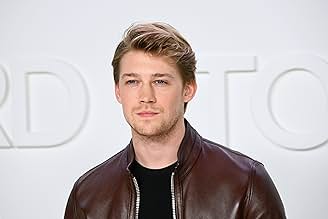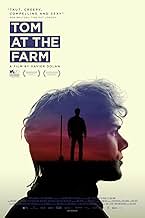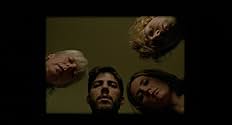AVALIAÇÃO DA IMDb
6,9/10
20 mil
SUA AVALIAÇÃO
Um homem de luto conhece a família de seu amado, que não sabia da orientação sexual de seu filho.Um homem de luto conhece a família de seu amado, que não sabia da orientação sexual de seu filho.Um homem de luto conhece a família de seu amado, que não sabia da orientação sexual de seu filho.
- Direção
- Roteiristas
- Artistas
- Prêmios
- 9 vitórias e 30 indicações no total
Caleb Landry Jones
- Guillaume
- (não creditado)
Mélodie Simard
- Petite fille
- (não creditado)
Avaliações em destaque
This film succeeds in pulling off what "Stranger By The Lake" totally failed to do. The darkness draws you in and intrigues us, and the characters are brilliantly acted and engaging.
Some of the editing is slightly strange, or perhaps the narrative would be a better way to describe it, i.e. there are a couple of transitions between scenes where I found I was having to piece things together arbitrarily, in my opinion, meaning I had to concentrate hard. However I'd much rather this than everything being spelled out in children's building blocks as is the way with many American films.
This is one of the few "gay" films I've seen that had hardly anything superficial and stereotypical about it, and wasn't depressing to watch as a gay man.
Hats off to the guy who played the crazy brother: dark and scary, but the homoerotic tones and suppressed desires sound through his silence, creating a fascinating villain, again, something which the aforementioned other French-language gay thriller completely failed to do, managing only to be faintly embarrassing and ridiculous.
Some of the editing is slightly strange, or perhaps the narrative would be a better way to describe it, i.e. there are a couple of transitions between scenes where I found I was having to piece things together arbitrarily, in my opinion, meaning I had to concentrate hard. However I'd much rather this than everything being spelled out in children's building blocks as is the way with many American films.
This is one of the few "gay" films I've seen that had hardly anything superficial and stereotypical about it, and wasn't depressing to watch as a gay man.
Hats off to the guy who played the crazy brother: dark and scary, but the homoerotic tones and suppressed desires sound through his silence, creating a fascinating villain, again, something which the aforementioned other French-language gay thriller completely failed to do, managing only to be faintly embarrassing and ridiculous.
Set in a lonely farm in Quebec, TOM A LA FERME concerns the inner life of the eponymous central character (Xavier Dolan) mourning the death of his lover. He goes to his lover's family's isolated farm for the funeral, and there encounters the mother (Lise Roy) and her other son (Pierre-Yves Cardinal), neither of whom were aware of the dead lover's sexuality.
The film concentrates on the gradual discovery by the family of their dead son's secret, and how it affects them. Francis is both horrified yet strangely affected; as the action unfolds, he develops an unnatural affection for Tom that is both sadistic and sexual. The mother seems to be unaware of what's happening around her, but perhaps she is just deliberately blinding herself to the truth as a means of self-protection. Tom finds himself imprisoned at the farm; even when his close acquaintance Sarah (Evelyne Brochu) comes to visit, he cannot contrive an effective escape.
TOM A LA FERME concentrates on the ways in which people conceal their private inclinations, even from their nearest and dearest, and the damage that actually causes them. This is especially true of Francis, who emerges from the film as a seriously disturbed character, masking his sexual inadequacies beneath a veil of strength. Yet the process of self-discovery for all the characters is an enabling one - so much so that when Tom finally escapes from the farm, he does not appear very happy to have done so. The film ends with a shot of him re-entering the city of Montreal, the lighted skyscrapers flashing by outside his car windows, with his face set in an expressionless gaze as he drives. It seems that 'freedom' for him is nothing more than a form of imprisonment; by extension, therefore, his imprisonment at the farm was an opportunity to discover some form of freedom.
Filmed on a series of bleak winter days in stark, washed-out colors, TOM A LA FERME is a searing psychological examination of sexualities and how they are often willfully concealed.
The film concentrates on the gradual discovery by the family of their dead son's secret, and how it affects them. Francis is both horrified yet strangely affected; as the action unfolds, he develops an unnatural affection for Tom that is both sadistic and sexual. The mother seems to be unaware of what's happening around her, but perhaps she is just deliberately blinding herself to the truth as a means of self-protection. Tom finds himself imprisoned at the farm; even when his close acquaintance Sarah (Evelyne Brochu) comes to visit, he cannot contrive an effective escape.
TOM A LA FERME concentrates on the ways in which people conceal their private inclinations, even from their nearest and dearest, and the damage that actually causes them. This is especially true of Francis, who emerges from the film as a seriously disturbed character, masking his sexual inadequacies beneath a veil of strength. Yet the process of self-discovery for all the characters is an enabling one - so much so that when Tom finally escapes from the farm, he does not appear very happy to have done so. The film ends with a shot of him re-entering the city of Montreal, the lighted skyscrapers flashing by outside his car windows, with his face set in an expressionless gaze as he drives. It seems that 'freedom' for him is nothing more than a form of imprisonment; by extension, therefore, his imprisonment at the farm was an opportunity to discover some form of freedom.
Filmed on a series of bleak winter days in stark, washed-out colors, TOM A LA FERME is a searing psychological examination of sexualities and how they are often willfully concealed.
To follow the chronic order, I decide to watch this film before Dolan's latest MOMMY (2014), which has just freshly arrived. TOM AT THE FARM is Canadian prodigy and Cannes darling Xavier Dolan's fourth film, adapted from Michel Marc Bouchard's play, this marks the first time he is not the sole writer for his works, it is also a veer of style for him, delves into the murky suspense and violence of a psychological thriller, and notably, in its highly strained chasing-in-the-forest incident near the coda, it conspicuously recalls another exceptional gay-themed thriller Alain Guiraudie's STRANGERS BY THE LAKE (2013, 8/10) of the same year, but these two films end with two completely contrasting options for our protagonists who both face irresistible sexual attraction from the sort who is too dangerous for their own good.
Sported as a perennially tacky curly blond, Dolan plays Tom, an urban advertisement editor who has just lost his boyfriend Guillaume in an accident. Driving en route to attend his funeral in a remote farm, Tom meets Guillaume's family members, his mother Agathe (Roy) and his brother Francis (Cardinal) who lives with her and whose existence has never been informed to Tom until now. On top of that, Agathe seems to be unwitting of Guillaume's sexual orientation, so Tom has to comfort her grievance by telling a white lie that Guillaume has a girlfriend named Sarah (Brochu), who in fact is just one of their common friends. Yet, Francis is the one who actually knows it all, his violent and homophobic behaviour towards Tom strikes a sadomasochistic thrill, which is not merely one-sided, as the film not-so- subtly implies Francis is a closeted homosexual himself. They both desperately or compulsively trace the resemblance or remnants of the deceased in each other, to the degree, Tom actually complies to act as a voluntary hostage on the farm and even enjoys the pastoral drudgery. One night Sarah's visit inopportunely provokes Agathe's deeply- buried agony, while apart from Francis' overcompensated interest in Sarah, Tom learns a horrible episode of his past from a bar owner, which overturns his perception of the tight corner where he is in. The second day, he decides to flee and turns his life back on track.
Here, Dolan again plays the Aspect Ratio gimmick, in the scenes where Tom is physically abused by Francis, it changes from the usual 1.85:1 to a more smothering letterbox; and if one is familiar with his narcissistic disposition, here he continues to wallow in close-ups, mostly on himself especially when Tom is anguish-ridden or being suffocated to barely catch a breath under Francis' masculine domination. While the entire film is coherently enveloped in an overcast dreariness, the close-knitted cast (both Roy and Brochu are from the original play) has done an amazing job in establishing the engaging tensions and occasionally a smack of warmth glistening. Roy and Cardinal are the MVPs, the former is offered a soul-pulverising flare-up while being consistently emotive during all her presence, and the latter beefs up his boorish machismo with very disarming appeal which superbly gilds an atmosphere of ambiguity in Francis' deadly mystique; on top of that the two together also builds up a detrimental mother-son relationship, which also wittily insinuates what has happened to the mother in the end, it is an innovative modus operandi to justify the plot-line without revealing everything in front of viewer's eyes.
As for our triple threat Dolan, with his Joker-alike makeup, he shows beyond doubt that apart from the ostentatious style bandwagon, he certainly is on his way to mature into a multi-faceted filmmaker who is able to tackle with the darkest corner of humanity and leaves his own trademark on it. A final nod to Dolan's cherrypick of songs, Rufus Wainwright's GOING TO A TOWN, appears in the ending credit, is an utterly poignant theme song for Tom's bumpy ride.
Sported as a perennially tacky curly blond, Dolan plays Tom, an urban advertisement editor who has just lost his boyfriend Guillaume in an accident. Driving en route to attend his funeral in a remote farm, Tom meets Guillaume's family members, his mother Agathe (Roy) and his brother Francis (Cardinal) who lives with her and whose existence has never been informed to Tom until now. On top of that, Agathe seems to be unwitting of Guillaume's sexual orientation, so Tom has to comfort her grievance by telling a white lie that Guillaume has a girlfriend named Sarah (Brochu), who in fact is just one of their common friends. Yet, Francis is the one who actually knows it all, his violent and homophobic behaviour towards Tom strikes a sadomasochistic thrill, which is not merely one-sided, as the film not-so- subtly implies Francis is a closeted homosexual himself. They both desperately or compulsively trace the resemblance or remnants of the deceased in each other, to the degree, Tom actually complies to act as a voluntary hostage on the farm and even enjoys the pastoral drudgery. One night Sarah's visit inopportunely provokes Agathe's deeply- buried agony, while apart from Francis' overcompensated interest in Sarah, Tom learns a horrible episode of his past from a bar owner, which overturns his perception of the tight corner where he is in. The second day, he decides to flee and turns his life back on track.
Here, Dolan again plays the Aspect Ratio gimmick, in the scenes where Tom is physically abused by Francis, it changes from the usual 1.85:1 to a more smothering letterbox; and if one is familiar with his narcissistic disposition, here he continues to wallow in close-ups, mostly on himself especially when Tom is anguish-ridden or being suffocated to barely catch a breath under Francis' masculine domination. While the entire film is coherently enveloped in an overcast dreariness, the close-knitted cast (both Roy and Brochu are from the original play) has done an amazing job in establishing the engaging tensions and occasionally a smack of warmth glistening. Roy and Cardinal are the MVPs, the former is offered a soul-pulverising flare-up while being consistently emotive during all her presence, and the latter beefs up his boorish machismo with very disarming appeal which superbly gilds an atmosphere of ambiguity in Francis' deadly mystique; on top of that the two together also builds up a detrimental mother-son relationship, which also wittily insinuates what has happened to the mother in the end, it is an innovative modus operandi to justify the plot-line without revealing everything in front of viewer's eyes.
As for our triple threat Dolan, with his Joker-alike makeup, he shows beyond doubt that apart from the ostentatious style bandwagon, he certainly is on his way to mature into a multi-faceted filmmaker who is able to tackle with the darkest corner of humanity and leaves his own trademark on it. A final nod to Dolan's cherrypick of songs, Rufus Wainwright's GOING TO A TOWN, appears in the ending credit, is an utterly poignant theme song for Tom's bumpy ride.
We distinctively perceive the characteristic atmosphere of Xavier Dolan's films: all the characters are on edge or even disturbed, and this dark and sensual film is made with a hyper sensitivity and a keen sense of photography.
First at all, Agathe is a mother who mourns her younger son died recently, and seems to understand the whole topic (undisclosed although you do not have to be a genius to intuit it) but represses her feelings and intuitions. Then Sarah a female blonde as hot as lost, and Francis, a farmer who is sexually attracted by Sarah (who would not be?) and hides himself behind a homophobic shell. Right in the middle of this bloody mess, Tom acts, contrary to appearances, like a temporary keystone, the whole microcosm gravitating around him. Although Tom is systematically delicate and cautious, especially with Agathe and even with Francis, in this farm, there is definitely a before and an after Tom, like a bull in a china shop, like a vault without its keystone.
A must see.
First at all, Agathe is a mother who mourns her younger son died recently, and seems to understand the whole topic (undisclosed although you do not have to be a genius to intuit it) but represses her feelings and intuitions. Then Sarah a female blonde as hot as lost, and Francis, a farmer who is sexually attracted by Sarah (who would not be?) and hides himself behind a homophobic shell. Right in the middle of this bloody mess, Tom acts, contrary to appearances, like a temporary keystone, the whole microcosm gravitating around him. Although Tom is systematically delicate and cautious, especially with Agathe and even with Francis, in this farm, there is definitely a before and an after Tom, like a bull in a china shop, like a vault without its keystone.
A must see.
This film tells the story of a man, called Tom, who pays an unannounced visit to his late boyfriend's farm in a small town in Quebec. He meets the brother who is violent and widely feared by the whole town. Yet, Tom is attracted to danger and stays at the farm.
This story is really captivating. It has so many subtle clues as to what the psychologically disturbed characters are thinking, which explain their behaviour. It drives viewers to think deeply about the reasons for their seemingly inexplicable behaviour, which is engaging and thrilling. Tom is clearly very attracted to being abused, and his psychological state is portrayed vividly by the film. There are some really dangerous moments in the film, making it thrilling. I really enjoyed watching "Tom at the Farm", and I look forward to watching other films by the same director.
This story is really captivating. It has so many subtle clues as to what the psychologically disturbed characters are thinking, which explain their behaviour. It drives viewers to think deeply about the reasons for their seemingly inexplicable behaviour, which is engaging and thrilling. Tom is clearly very attracted to being abused, and his psychological state is portrayed vividly by the film. There are some really dangerous moments in the film, making it thrilling. I really enjoyed watching "Tom at the Farm", and I look forward to watching other films by the same director.
Você sabia?
- CuriosidadesManuel Tadros (the bar owner) is the father of Xavier Dolan in real life.
- ConexõesFeatured in Xavier Dolan: à l'impossible je suis tenu (2016)
- Trilhas sonorasLes Moulins de mon Coeur
(The Windmills of your Mind)
Music by Michel Legrand
English lyrics by Alan Bergman and Marilyn Bergman
French lyrics by Eddy Marnay
Published by EMI U Catalog Inc.
(1968)
Sung a capella by Kathleen Fortin
(heard in the opening sequence while Tom is at the wheel of his car)
Principais escolhas
Faça login para avaliar e ver a lista de recomendações personalizadas
- How long is Tom at the Farm?Fornecido pela Alexa
Detalhes
- Data de lançamento
- Países de origem
- Centrais de atendimento oficiais
- Idioma
- Também conhecido como
- Tom at the Farm
- Locações de filme
- Montréal, Quebec, Canadá(final scenes)
- Empresas de produção
- Consulte mais créditos da empresa na IMDbPro
Bilheteria
- Faturamento bruto mundial
- US$ 687.505
- Tempo de duração
- 1 h 42 min(102 min)
- Cor
- Proporção
- 1.85 : 1
Contribua para esta página
Sugerir uma alteração ou adicionar conteúdo ausente

![Assistir a Bande-annonce [OV]](https://m.media-amazon.com/images/M/MV5BYmNhYmI5ZGQtY2MwZS00NDM5LWIwMzktNWZhOTllYjQ0ZDRkXkEyXkFqcGdeQXRyYW5zY29kZS13b3JrZmxvdw@@._V1_QL75_UX500_CR0)

































